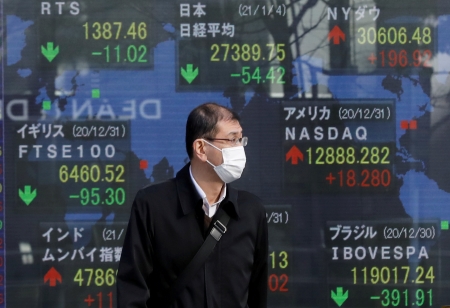
Asian financial markets were little changed on Tuesday (Mar 7) as investors awaited Federal Reserve Chair Jerome Powell's congressional testimony, which was scheduled to begin later in the day, for clues on the central bank's next interest rate move.
MSCI's broadest index of Asia-Pacific shares outside Japan was unchanged after US stocks closed with minor gains the previous session. So far this month, the index is up 2.9%.
The yield on benchmark 10-year Treasury notes reached 3.9675 percent, up from 3.983 percent on Monday.
The two-year yield, which rises as traders expect higher Fed fund rates, reached 4.8945 percent, compared to 4.894 percent at the close in the United States.
Australian shares were down 0.1% after falling 0.3% earlier in the session, while Japan's Nikkei stock index rose 0.5%.
BHP Group and Rio Tinto were dragged down by Australian stocks, which analysts said were weaker on the back of China's growth target of around 5% for 2023.
"The lack of new stimulus measures meant that China is currently content with simply stabilising its economy, a move that was not seen as supportive of global growth," Ord Minnett analysts said.
"As a result, commodity prices and commodity-related stock prices fell (overnight)."
The Reserve Bank of Australia (RBA) is widely expected to order its tenth consecutive interest rate increase today at 2.30pm AEDT (3.30am GMT), raising the official cash rate by 25 basis points to 3.6%.
The Hang Seng Index in Hong Kong was up 0.06 percent, and China's blue chip CSI300 Index was up 0.07 percent.
Overnight, the Dow Jones Industrial Average gained 0.12%, the S&P 500 gained 0.7%, and the Nasdaq Composite lost 0.11 percent.
Powell's semi-annual testimony before Congress on Tuesday and Wednesday will be closely watched for clues about the extent and duration of the US central bank's restrictive monetary policy aimed at preventing inflation.
Fed funds futures traders are pricing in a 76% chance that the Fed will raise rates by 25 basis points (bps) at its March 21-22 meeting, and a 24% chance that rates will rise by 50 bps.
In the United States, the Labor Department's February employment report is due on Friday, and any signs of softening in the robust labour market will be interpreted as evidence that the Fed's hawkish stance is having the desired effect.
"The congressional testimony in the coming days will be crucial for markets. Investors have priced in what the Fed is likely to do with interest rates in March and into the second quarter "said Tai Hui, chief Asian market strategist at JPMorgan Asset Management.
Hui added that February US non-farm payrolls will be closely watched after a strong January number, with markets "seemingly directionless" awaiting macroeconomic data and US policy comments.
Bank of America CEO Brian Moynihan told a Sydney business summit on Tuesday that the US economy would enter a technical recession later this year before the central bank began cutting rates in 2024.
"In the grand scheme of things, it's a minor downturn. I don't believe there will be a severe recession "He stated.
"In our opinion, that is due to a corporate or commercial slowdown, not a consumer slowdown."
In Asian trading, the dollar rose 0.13 percent against the yen to 136.08, remaining lower than the year's high of 137.09 reached last week.
The euro was up 0.1% on the day at US$1.0683, after rising 1.1% in a month, while the dollar index, which measures the greenback against a basket of currencies from other major trading partners, was down at 104.25.
West Texas Intermediate crude in the United States rose 0.28 percent to US$80.69 per barrel. Brent crude was up, trading at $86.49 per barrel.
Gold was down slightly. The spot price of gold was $1846.43 per ounce.
We use cookies to ensure you get the best experience on our website. Read more...